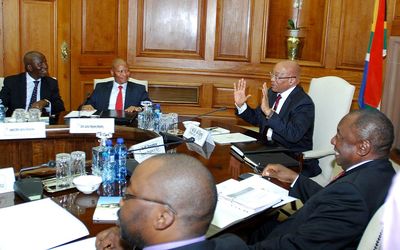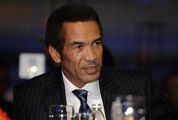A MEETING to clear the air between the judiciary and executive on Thursday ended with agreement on measures on how to deal with each other with "mutual respect".
Chief Justice Mogoeng Mogoeng made it clear judges were doing what was required of them by the Constitution and the fact that it "pinched" at times demonstrated this.
It was clear that the issue of judges "overreaching" and the separation of powers remained a sticking point after a seven-hour meeting between SA’s top judges and President Jacob Zuma and Cabinet members that was prompted by strident criticism of the judiciary by politicians.
The meeting was hailed as "historic" and "epoch making" by Mr Zuma and Justice Mogoeng.
Justice Mogoeng said there was "deep-seated" concern about the "manner in which we deal with the separation of powers and related issues".
The issues had been raised several times and warranted "deeper engagement", Justice Mogoeng said.
"As the judiciary, we obviously don’t think that we are overreaching but you know it is not always that you can be the best judge of yourself.
"So we would benefit from the views, the constructive views and criticism from other arms of the state," he said.
It was the manner in which that criticism was levelled that was important, the chief justice said.
Flanked by Mr Zuma, Justice Mogoeng said neither side should allow themselves to be "blinded by their own sides of correctness".
"Open yourself up to the concerns of others even if you may not agree with them, there may just be something to learn from that criticism," he said.
Justice Mogoeng viewed the criticism about the separation of powers as a sign of a healthy democracy.
"I think it bears testimony to the fact that everybody, the judiciary in particular, is doing what it is supposed to do. I will be worried (if) in any proper constitutional democracy if differences are of a minor nature … where everybody is doing what he or she is constitutionally mandated to do it is bound to pinch somewhere and where it does, it attracts reaction," he said.
Judges and the executive agreed on 10 points that would guide interaction between them. Mr Zuma said these included respect for the separation of powers and institutions. Where judges acted unethically, they should be reported to the relevant bodies, the two sides agreed.
Mr Zuma alluded to the setting up of a mechanism for judges to complain should they feel they were being unfairly treated by the executive.
They agreed that court orders should be respected and complied with. The tension between the two arms of state grew after the government violated a court order compelling it to detain Sudanese President Omar al-Bashir while he was in the country for an African Union summit in June.
Mr Bashir was wanted by the International Criminal Court for numerous atrocities.
The government was sharply criticised for violating the court order by Gauteng Judge President Dunstan Mlambo, who was part of Thursday’s meeting.
The judiciary in turn was roundly slated by politicians.
The 10 points agreed to on Thursday included that there be care and caution exercised with public statements about and criticism of one another; and the ethos and values of the Constitution be promoted and the Constitution be protected and upheld.
Thursday’s meeting was the "foundation" for future discussions, they said.

President Jacob Zuma and Chief Justice Mogoeng Mogoeng at Thursday’s meeting. Picture: MOELETSI MABE/THE TIMES
A MEETING to clear the air between the judiciary and executive on Thursday ended with agreement on measures on how to deal with each other with "mutual respect".
Chief Justice Mogoeng Mogoeng made it clear judges were doing what was required of them by the Constitution and the fact that it "pinched" at times demonstrated this.
It was clear that the issue of judges "overreaching" and the separation of powers remained a sticking point after a seven-hour meeting between SA’s top judges and President Jacob Zuma and Cabinet members that was prompted by strident criticism of the judiciary by politicians.
The meeting was hailed as "historic" and "epoch making" by Mr Zuma and Justice Mogoeng.
Justice Mogoeng said there was "deep-seated" concern about the "manner in which we deal with the separation of powers and related issues".
The issues had been raised several times and warranted "deeper engagement", Justice Mogoeng said.
"As the judiciary, we obviously don’t think that we are overreaching but you know it is not always that you can be the best judge of yourself.
"So we would benefit from the views, the constructive views and criticism from other arms of the state," he said.
It was the manner in which that criticism was levelled that was important, the chief justice said.
Flanked by Mr Zuma, Justice Mogoeng said neither side should allow themselves to be "blinded by their own sides of correctness".
"Open yourself up to the concerns of others even if you may not agree with them, there may just be something to learn from that criticism," he said.
Justice Mogoeng viewed the criticism about the separation of powers as a sign of a healthy democracy.
"I think it bears testimony to the fact that everybody, the judiciary in particular, is doing what it is supposed to do. I will be worried (if) in any proper constitutional democracy if differences are of a minor nature … where everybody is doing what he or she is constitutionally mandated to do it is bound to pinch somewhere and where it does, it attracts reaction," he said.
Judges and the executive agreed on 10 points that would guide interaction between them. Mr Zuma said these included respect for the separation of powers and institutions. Where judges acted unethically, they should be reported to the relevant bodies, the two sides agreed.
Mr Zuma alluded to the setting up of a mechanism for judges to complain should they feel they were being unfairly treated by the executive.
They agreed that court orders should be respected and complied with. The tension between the two arms of state grew after the government violated a court order compelling it to detain Sudanese President Omar al-Bashir while he was in the country for an African Union summit in June.
Mr Bashir was wanted by the International Criminal Court for numerous atrocities.
The government was sharply criticised for violating the court order by Gauteng Judge President Dunstan Mlambo, who was part of Thursday’s meeting.
The judiciary in turn was roundly slated by politicians.
The 10 points agreed to on Thursday included that there be care and caution exercised with public statements about and criticism of one another; and the ethos and values of the Constitution be promoted and the Constitution be protected and upheld.
Thursday’s meeting was the "foundation" for future discussions, they said.























Change: -2.60%
Change: -2.88%
Change: -2.44%
Change: -2.44%
Change: -5.26%
Data supplied by Profile Data
Change: 0.00%
Change: 0.00%
Change: -2.60%
Change: 0.00%
Change: 0.00%
Data supplied by Profile Data
Change: 1.98%
Change: -0.06%
Change: -0.19%
Change: -0.09%
Change: 0.57%
Data supplied by Profile Data
Change: 0.00%
Change: 0.00%
Change: 0.00%
Change: 0.00%
Change: 0.00%
Data supplied by Profile Data